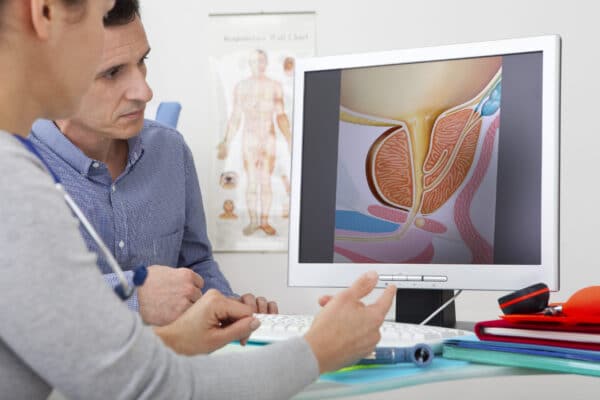WHAT IS BENIGN PROSTATE HYPERPLASIA (BPH)?
Benign prostate hyperplasia is the medical terminology used when referring to an enlarged prostate or prostate enlargement. This is a common condition that affects men as they age. Men can begin to experience symptoms of benign prostate hyperplasia in their 40s and 50s and more than 50% of men have enlarged prostates in their 60s. Having benign prostate hyperplasia does not increase the risk of prostate cancer.
The prostate is a small gland that sits just below the bladder and surrounds the urethra, or the tube that passes urine from the bladder through the penis. As the prostate enlarges, the tissue around the prostate eventually restricts its growth causing the gland to put pressure on the urethra. This pressure eventually leads to urinary tract symptoms.

SYMPTOMS OF ENLARGED PROSTATE
As the prostate enlarges and restricts the urethra, several symptoms can occur that are a result of two different factors; obstructive and changes in the bladder. The obstructive symptoms are caused by pressure on the urethra and usually develop first such as:
For patients who have had an enlarged prostate for many years, the bladder begins to change as a result of the obstructive symptoms. The bladder acts as a pump that pushes the urine out of the body. After a period of time, the bladder muscle tends to become thicker, stronger and more sensitive causing it to contract frequently with only small amounts of urine. This sensation is known as urinary frequency. If you urinate more than 8 times a day, you may be diagnosed with urinary frequency. Other symptoms related to changes in the bladder include:
Urinary retention can become a more serious complication of benign prostate hyperplasia. The risk of urinary tract infections increases if the bladder retains urine. Urinary retention may also lead to bladder stones which may cause blood in the urine. Urinary incontinence, or the loss of bladder control, can develop if the benign prostate hyperplasia is left untreated.
If the flow of urine is completely blocked, this is a medical emergency. You will need to seek medical attention immediately for acute urinary retention.
DIAGNOSIS OF ENLARGED PROSTATE
At Blue Ridge Urological, we specialize in making swift and accurate diagnoses so that we can develop an effective treatment plan to help you manage the symptoms of enlarged prostate. Diagnosing benign prostate hyperplasia early is important as it helps to prevent further complications of the condition such as urinary tract infections, bladder stones, kidney stones and incontinence. During your consultation with one of our board certified urologists, we will record your medical history and perform a physical examination. We will also perform several types of tests to determine the best way to treat your specific urological issues.
TREATMENT FOR ENLARGED PROSTATE
At Blue Ridge Urological, we specialize in diagnosing and treating conditions of the urinary tract. If you have been diagnosed with benign prostate hyperplasia, you may not need treatment until you develop symptoms that are bothersome or complications such as urinary tract infections.
The first line of treatment is usually suggesting lifestyle modifications that include eating healthy and avoiding alcohol or caffeinated beverages. Restricting your drinking after 8:00 pm may help with urinary frequency at night.
There are medications, known as alpha-blockers, that can help to relax the muscles in the prostate and bladder which may improve the flow of urine. Other medications work by shrinking the prostate over time. It may take 6-12 months to notice an improvement in symptoms of BPH. You and your provider will be able to discuss the risk/benefit analysis of these medications to determine what is right for you.
REQUEST YOUR
